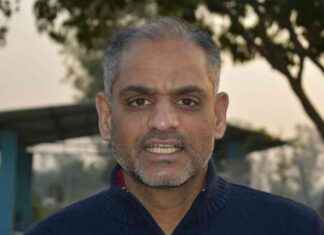He was supposed to monitor seriously ill patients, but instead he cured his hangover, worked on his cell phone – and if the patients bothered him, he “silenced” them. With deadly consequences.
A nurse accused of two murders and six attempted murders has confessed to the Munich I Regional Court. “I made a big mistake there,” said the accused at the beginning of the trial on Tuesday.
A total of six assassination attempts
It was not his intention for anyone to die. But he always drank a lot of alcohol before his shift and then wanted to sleep off his intoxication. “Because I was drunk, there was only one option for me: to calm you down,” says the 26-year-old and now emphasizes: “I’m sorry from the bottom of my heart.”
The Munich I public prosecutor accuses the man of killing two of his patients in 2020 and trying to kill three others. Because he tried it several times with two of these patients, the prosecution counts a total of six murder attempts. Two 80 and 89 year old patients died.
According to the indictment, the man injected the patient in a so-called guard station, an intermediate station between intensive care and normal ward, sedatives, adrenaline or blood thinners. One of the patients of the man from North Rhine-Westphalia was the writer Hans Magnus Enzensberger, who died in 2022 at the age of 93.
The prosecutor speaks of a “defendant driven by selfishness and only concentrating on his own well-being”. He wanted to sleep or deal with his cell phone. The accused does not deny this and admits frankly: “To put it bluntly, I had a hangover.” He was “stressed himself”. “I was dealing with myself.” The 26-year-old says again and again that he never intended to put people in danger or even kill them. But he already accepted that that could happen.
“When I was working, I mostly didn’t do anything,” he says. Contrary to his duties, he did not wash the patients or speak to them when they became restless. He falsified values ??that he was supposed to measure at night. Only in the morning did he put the patients on – for rounds. In their wheelchairs, he then turned them to face the wall. “Then the patients are calmer. If they are in eye contact with the others, they can talk.”
He enjoyed his “position of power”.
However, he not only wanted his peace and quiet, but also enjoyed the fact that the doctors were at a loss when the patients, some of whom were on the mend, suddenly felt so bad again, according to the indictment. He enjoyed this “position of power”. When he gave patients medicines that weren’t intended for them, he enjoyed playing doctor.
According to the indictment, he gave a woman who had a head drain after head surgery 25,000 units of the blood thinner heparin. He “didn’t know that 25,000 units was that much,” says the accused. This may also be due to the fact that he is not a nurse at all, although he worked as such in the Munich Klinikum Rechts der Isar, but a geriatric nurse.
A temporary employment agency from Austria had put him in contact with the hospital. He was not allowed to work in Austria at the time because he had a criminal record for theft there. And so he rented a hotel in Munich and took a taxi to the clinic every evening for the night shift – because he was too drunk for the subway and wanted to take advantage of every second in the hotel, he says.
In the four months that he worked in the Munich hospital, he claims to have drunk every day – and so heavily that not only judge Norbert Riedmann, but also a medical expert in the room have doubts about the descriptions. There is talk of at least 30 Jägermeister shots at the weekend when Gladbach is playing – plus eight beers. “Then the Ruhrpott came through: urinated in front of the pub, badly behaved.”
He drank eleven or twelve bottles of beer at the gas station in the morning after the night shift. He explains that he endured it with habit and his body mass: “Two meters, 120 kilos.”
Munich clinic was “dismayed”
He also claims to have taken heavy sedatives regularly – diverted from orders he himself placed for the Klinikum Rechts der Isar. “They don’t pay that much attention to it in the hospital.” He explained that he was able to take the medication for himself and the accused murders and attempted murders without anyone noticing.
The Munich clinic was “dismayed” by the allegations. “At the University Hospital on the Right Bank of the Isar, there are strict procedural instructions for medication,” said a spokeswoman for the clinic when asked by the German Press Agency. As a rule, only doctors are allowed to order medicines from the in-house pharmacy. “Nursing staff can only be authorized to do so in exceptional cases.” Whether such an exception applied to the accused nurse initially remained open.
The defendant also tells the court that a supervisor noticed that he came to work with a streak of alcohol and that he was caught on several occasions sleeping soundly instead of keeping an eye on his patients. “In the university hospital on the right bank of the Isar, there is a zero tolerance limit for alcohol on duty. Employees who show up to work intoxicated are immediately sent home by their superiors and must also expect consequences under employment law. This also applied to the accused”, says the clinic spokeswoman.
Since the cases, which were uncovered by an attentive resident of the clinic, became known, the hospital has tightened its “internal security regulations and control mechanisms again”.












